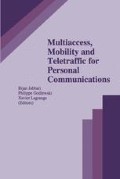Abstract
In this paper we investigate the effect of chip synchronization error (or chip timing jitter) in multi-carrier code division multiple access (MC-CDMA) schemes for indoor environments. We model the chip timing jitter as a stationary random process with a known statistic and the error produced by chip timing jitter as an additive noise source. We evaluate the spectral density of this noise and we show that it can be split into two uncorrelated components. These results are important because they allow us to use an analytical or semi-analytical formula for the error probability evaluation. This is helpful, because the simulation of a MC-CDMA system is complex and time consuming. To mitigate the effect of chip synchronization error, a time diversity technique (average diversity combining) is suggested.
Access this chapter
Tax calculation will be finalised at checkout
Purchases are for personal use only
Preview
Unable to display preview. Download preview PDF.
References
N. Yee, J.P. Linnartz and G. Fettweis, “Multi-carrier CDMA in indoor wireless radio networks,” in Proc. PIMRC ’93, pp. 109–113, Yokohama, Sept. 1993.
L. Vandendorpe, “Multitone spread spectrum multiple access communications system in a multipath Rician fading channel,” IEEE Trans. on Vehicular Technology, vol. 44, no. 2, pp. 327–337, May 1995.
A. Chini, M.S. El-Tanany, S.A. Mahmoud, “High rate ATM packet transmission over indoor radio channels,” in Proc. VTC ’95, pp. 195–199, Chicago, July 1995.
T. Pollet, M. Van Bladel and M. Moeneclaey, “BER sensitivity of OFDM systems to carrier frequency offset and Wiener phase noise,” IEEE Trans. on Commun., vol. 43, no. 2/3/4, pp. 191–193, Feb./Mar./Apr. 1995.
E. Viterbo, K. Fazel, “How to combat long echoes in OFDM transmission schemes: sub-channel equalization or more powerful channel coding,” in Proc. GLOBECOM ’95, pp. 2069–2074, Singapore, Nov. 1995.
J.G. Proakis, Digital Communications. 3rd ed., New York, McGraw-Hill 1995.
T. Pollet and M. Moeneclaey, “Synchronizability of OFDM signals,” in Proc. GLOBECOM ’95, pp. 2054–2058, Singapore, Nov. 1995.
G. Wu, A. Jalali, P. Mermelstein, “On channel model parameters for microcellular CDMA systems,” IEEE Trans, on Vehic. Technol., vol. 44, no. 3, pp. 706–711, Aug. 1995.
S. Souissi, S. B. Wicker, “A diversity combining DS/CDMA system with convolutional encoding and Viterbi decoding,” IEEE Trans, on Vehicular Technology, vol. 44, no. 2, pp. 304–312, May 1995.
S. Kaiser, “On the performance of different detection techniques for OFDM-CDMA in fading channels,” in Proc. GLOBECOM ’95, pp. 2059–2063, Singapore, Nov. 1995.
H. Sari, G. Karam, and I. Jeanclaude, “Transmission techniques for digital terrestrial TV broadcasting,” IEEE Commun. Magazine, vol. 33, no. 2, pp. 100–109, Feb. 1995.
L. Tomba and W.A. Krzymien, “Downlink detection schemes for MC-CDMA systems in indoor environments,” submitted to IEICE Transactions, Special Issue on Personal Communications.
Author information
Authors and Affiliations
Editor information
Editors and Affiliations
Rights and permissions
Copyright information
© 1996 Kluwer Academic Publishers, Boston
About this chapter
Cite this chapter
Tomba, L., Krzymien, W.A. (1996). On the Effect of Chip Synchronization Error in MC-CDMA Systems. In: Jabbari, B., Godlewski, P., Lagrange, X. (eds) Multiaccess, Mobility and Teletraffic for Personal Communications. The Kluwer International Series in Engineering and Computer Science, vol 366. Springer, Boston, MA. https://doi.org/10.1007/978-1-4613-1409-7_4
Download citation
DOI: https://doi.org/10.1007/978-1-4613-1409-7_4
Publisher Name: Springer, Boston, MA
Print ISBN: 978-1-4612-8611-0
Online ISBN: 978-1-4613-1409-7
eBook Packages: Springer Book Archive

